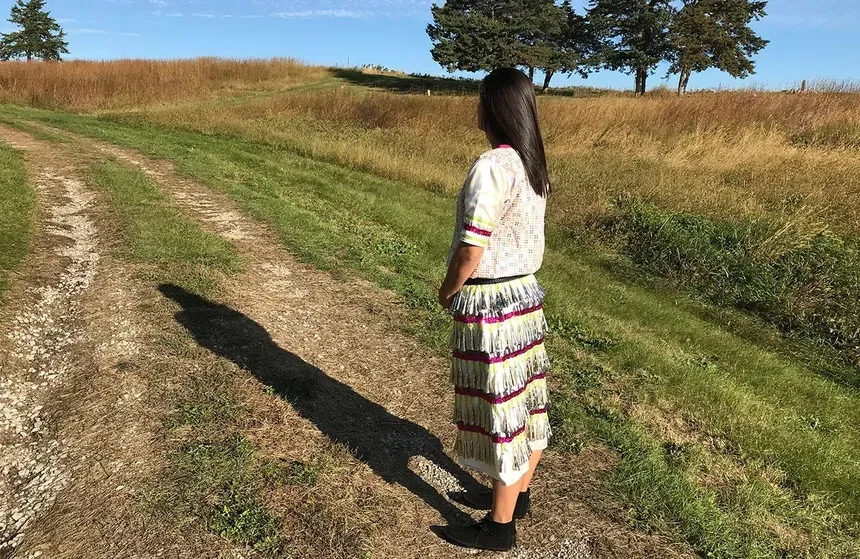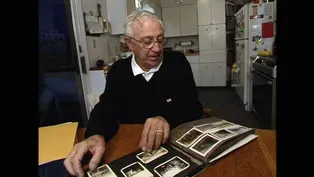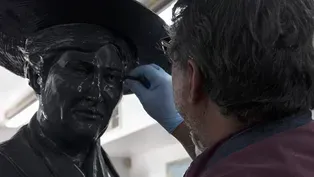
Willa Comes Alive and More
Season 13 Episode 10 | 28m 7sVideo has Closed Captions
The new Willa Cather sculpture, Holocaust survivor Benny Hochman, seasons of Platte River
Omaha sculptor Littleton Alston won the commission to create a bronze of Willa Cather for National Statuary Hall, Benny Hochman a story of a Holocaust Survivor, The four seasons of the Platte River Basin in timelapse, William Stansbury built a brick building in the small town of Nelson and adorned it with 12 life-sized, peculiar looking faces carved by a local stonemason.
Problems with Closed Captions? Closed Captioning Feedback
Problems with Closed Captions? Closed Captioning Feedback
Nebraska Stories is a local public television program presented by Nebraska Public Media

Willa Comes Alive and More
Season 13 Episode 10 | 28m 7sVideo has Closed Captions
Omaha sculptor Littleton Alston won the commission to create a bronze of Willa Cather for National Statuary Hall, Benny Hochman a story of a Holocaust Survivor, The four seasons of the Platte River Basin in timelapse, William Stansbury built a brick building in the small town of Nelson and adorned it with 12 life-sized, peculiar looking faces carved by a local stonemason.
Problems with Closed Captions? Closed Captioning Feedback
How to Watch Nebraska Stories
Nebraska Stories is available to stream on pbs.org and the free PBS App, available on iPhone, Apple TV, Android TV, Android smartphones, Amazon Fire TV, Amazon Fire Tablet, Roku, Samsung Smart TV, and Vizio.

Do you have a Nebraska Story?
Do you have a story that you think should be told on Nebraska Stories? Send an email with your story idea, your name, your city and an email address and/or phone number to nebraskastories@nebraskapublicmedia.org. Or, click the link below and submit your information on nebraskastories.org.Providing Support for PBS.org
Learn Moreabout PBS online sponsorship- [Narrator] Coming up on Nebraska Stories inside a Colorado foundry with Willa Cather, Holocaust survivor Bennie Hochman shares his story, the four season of an iconic river set to music, and the faces of Nelson immortalized in stone.
(steady rock music) (bright upbeat music) (machine whirring) - [Christine] A foundry is a place where imagination comes to life.
- [Littleton] And I walked into the space and there she was.
And I know her so intimately.
It was almost like going into a dinner party and seeing an old friend, and it just zoomed right in, right across the space.
(machine whirring) - [Christine] Omaha, sculptor, Littleton Alston has been imagining Willa Cather ever since he won the commission to create her in bronze.
(machine whirring) Today, she awaits her final transformation in Loveland, Colorado.
- [Littleton] And today, of course, it's just moving to patina.
It brings the piece to life.
It'll go down dark and it'll come back up.
And it's going to warm it up.
And it's going to it'll be the finished work, what you'll see.
(bright music) - [Christine] It all began when the Nebraska legislature voted for two new statues to represent Nebraska in Statuary Hall at the US Capital.
Two new heroes, Ponca chief, Standing Bear who went to court to prove he was a person under the law.
And Willa Cather, whose novels created a new vision of the American frontier.
(bright music) (bright upbeat music) (children laughing) Littleton Alston's bronze creations are all over Omaha and beyond.
(bright music) But Willa Cather is his most important commission yet.
First, he had to get to know her.
(upbeat music) - [Littleton] I'd look at each of the images and just to sort of get a sense of her, but also, just to make sure that, because I sculpt from the inside out, that all the everything, is there.
So I'm not making a doll, I'm actually making a human form.
(bright upbeat music) (car engine roaring) - [Christine] In May of 2019 at the Willa Cather Symposium, in Red Cloud, Nebraska, Alston shared his first concept in the form of a clay maquette.
- [Littleton] I look at the maquette as a poem and then I look at the four-foot version as a short story.
And then the seven-foot, which will be in bronze of Willa in Statutory Hall, will be the novel.
-[Man] Oh, very nice.
(audience applauds) -[Littleton] Hey!
-Hello, hello!
-Bonjourno.
-Bonjourno.
(laughs) - [Christine] Three months later, in his Omaha studio the poem has become the short story.
- Okay.
Here it is.
- [Christine] As Alston reveals the four-foot clay model to tje Willa Cather National Statuary Hall selection committee.
- [Littleton] I put in around her, the memories of Nebraska.
So there's the wagon wheel and the arc of the wheel here, as well as here.
And then the cane, coming up with her pen.
And her writings.
So she's striding forward... into history, as a great writer.
(bright music) - [Christine] More than two years later, Willa Cather is reborn in fire and molten bronze.
Emerging piece by piece at the Colorado Foundry.
(fire roaring) (gentle music) (forklift engine roaring) (horn honking) - Now she's seven-feet tall and made of raw metal, but she's about to experience a storm that will prepare her surface for what Littleton calls a metamorphosis.
(machine spraying) Fine grains of sand prepare the hard metal surface to absorb color and texture.
-(machines whirring) -(bright music) Patina comes next.
The application of a chemical compound to the surface of a metal sculpture.
First comes the rain.
- [Littleton] The patina adds almost a sense of soul to the piece.
It brings it alive in a way that just the raw metal doesn't look like it.
- [Christine] Then the fire.
- [Littleton] It's like an adrenaline rush and it's beautiful to see it.
(mysterious music) The heat and the fire and the, just the way in which it becomes almost a primal emergence of a of a form, it's just astonishing!
It's almost like we're pulling it out of this cradle, right?
And it's just... you know, it's coming alive right in front of you.
(bright music) It lifts my heart to see it.
Oh my goodness, it does!
Something creative, right?
Something beautiful that's gonna go in there.
Willa's gonna hold her own.
-(bright music) -(machines spraying) (bright upbeat music) - My father was a big fellow, he about six foot, four, strong, my mother was a five foot, barely, and 100 pounds probably or less, and then I had an older brother and myself and a younger sister.
My parents were in business, they were, my father was a baker and he owned a little old bakery and he had a few people working for him.
About twice a year, he would put on a little (chuckles), a little party for, invite a bunch of friends, make a bunch of homemade brew (chuckles) and some homemade wine and take a porker and a lamb, side by side, all dressed up and seasoned and stick it in the baker oven and bake them together and come around, the friends come around and rip the meat off (laughs) and drink the little wine and beer and sing.
Singing was always loud singing, you know, my mother would play the piano and they would have a ball.
- [Narrator] These pictures of the preparation for attack and later the actual combat, were all made by a German frontline cameraman, therefore, they stress Nazi superiority.
Success is unimpeded as Hitler divisions move against outnumbered Polish defenders.
- When they came after us, my brother and myself, and they loaded us up in those box cars and when we talk about box cars, you had to be anybody that, had to be ever in Europe to see the size of them, they're so much smaller than you see in America, you know and they would shove 100 of us in there and to this day, I don't know how many days and nights we were in there, traveling, park, traveling, and the box car never opened up, no food, no drink, no nothing, until we finally arrived in this place that, I really didn't know what this place was, you know, and that was Auschwitz.
Auschwitz was taken over and it used to be an old military base or something, that's why they kind of brick buildings, you know, that's old Auschwitz.
I guess they didn't know what to do with us, they didn't have no room for us or whatever, and that's when I lost my brother because he got sick right away, diarrhea, terribly bad and he couldn't be propped up even to stand up when they wanted us to line up to be counted, there was no place to go to, barb wire already was energized and when we could not prop him up, me and my other friends, you know, prisoners there, they shot him beside my feet.
I think that was the killer to me to, I mean, right there, it just hurt me terrible, terrible, bad because I was so close to him and he was my pride, you know, an officer in the military, you know and strong and handsome and everything and I loved him, and when they killed him, I just.
The good Lord must have wanted me to live because when they segregated us, picked us over like cattle, lined us up and you go, right, you go left, and when I went to the left and the others went to the right, the ones that went to the right was marched off and there's a forest right close by there, Auschwitz is circled by a forest, you might say, and you could hear the machine guns, the fire, you know, all those people were killed right there and then and buried in mass graves, and the ones that went to the left, like myself, received our numbers, tattooed in my left arm and I then decided, I just, saying to myself, I'm going to live, I'm going to survive.
In the beginning, Poland was the first country to be invaded, so, in the beginning, it was all Polish practically, and Germans, there were German people there that were anti or at least that's what they were accused of being anti-Nazi anti-Hitler, were brought there, but then as the war was going fast, then Czechoslovakia, Yugoslavia, Romania, Hungary just Albania, country after country, then France, Belgium, Holland and all you needed to do is just listen to the language, that people spoke and you knew or you didn't need no newspaper, you knew where they're coming from.
It didn't bother me a bit then, but it bothers me so badly now, the lie, like stamp officer would get on a little box, there was a little box sitting there and he would get on there so it'd be high up, and he make a little speech that you have arrived to the labor camp, and the barracks are waiting for you where you're gonna live, but you are all lousy, really, you've got to be clean first and for the first year or so, they would even have the people undress, naked, here total strangers, several hundred people or a thousand people or whatever, from this whole train would be standing naked there and they would hurl them in to the bath house.
They even, for a while, they even furnished them with a towel and a bar of soap for family, but once they got in there, you know, there was no shower or nothing, no bath, the door was closed and the gas come down from the ceiling.
And many a times, 20 minutes or half an hour, the floor would open up and me and three other men and several other groups just like it, they called us the commandos, we would be working under the gas house to pick up the bodies when they were gassed and the floor would open and drop to the cellar or to the below, and we would pick up the bodies and throw them on the wagons.
Our life depended on that we did not throw a body on there with rings on the fingers, gold in the mouth or hair on the head, especially women, you know, in those days, long hair, that was all sheared off and great, big gunnysacks we had, we filled the gunnysacks full with hair, knocked the teeth out, put the little box hanging on the side of the, this flat wagon, just like you hurl hay or straw on the farm, a ranch, and rings, you couldn't pull off the ring because the hand was twisted, we had this little hatchet, you know, and we took the finger and all, and then we would push the wagon over to the crematoriums and drop the bodies there and go back and get another load.
I had a lot of hate in me, I wanted to get even for killing my brother right there beside my feet, his blood running out of him, you know, and it just, I have tough times talking about that, and then while I was in there after two years or so they brought my father, mother and little sister there and I didn't get to see them but they were also gassed.
Camp was closed and I laid there in a gutter next to the barrack, I don't know how I ended up there, but that's where I was, and when Charles Kenny in his early room man, a couple moved in, came in and Charles saw me laying there and he threw me a piece of hard candy outta the K ration, just hard as a rock, piece of chocolate and I was sore that I didn't even bother about picking it up, and he became a dear friend and he's told me that many a times and I didn't bother and he just got out the Jeep and just picked me up, and later on years, I thought I weighed 87 pounds and he corrected me several times, no, no, you weigh 78 pounds, tall as I am today or maybe an inch taller, and he put me in the Jeep and he says, "I had enough.
I saw enough," that's his words and he drove out of there and this is the man, my angel, the man that liberated me, and this is my other angel, Ed Townley, that brought me to this country.
So, I befriended all, every one of them became just very, very close to me, dear.
The best medicine is American soldiers would come by and tap me on the head, tap me on the shoulder leave me cigar, cigarettes, chewing gum, but the smile, you know, it just, I think that gave me hope, life, you know, and it just, my mind started clearing and I kept thinking, "My gosh, this man's got the same color uniform as the guy just a few days ago, was kicking me and hitting me and, same color uniform, same color skin, same color you know, a little different insignias, different shaped helmet but, so, I fell, I started falling in love with the American soldier, you know, the GI.
A lot of tears were flowing, I got very emotional because the Townley family just, super and grandma and grandpa Townley, just hug me and they said, well, we have a large family, we just increased by one, one more.
So, it was very emotional and it ended up exactly the way I saw it, because even after my kids were born, that was grandma and grandpa, you know, and just, it was wonderful.
(upbeat music) (peaceful music) ♪ ♪ (upbeat music) NARRATOR: Watch more Nebraska Stores on our website, Facebook, and YouTube.
Nebraska Stories is funded in part by the Margaret and Martha Thomas Foundation.
(upbeat music) Captions by FINKE/NET (upbeat music) Copyright 2020 NET Foundation for Television
Benny Hochman, Holocaust Survivor
Video has Closed Captions
Clip: S13 Ep10 | 13m 19s | Benny Hochman was 16 when he was imprisoned at Auschwitz (13m 19s)
Video has Closed Captions
Clip: S13 Ep10 | 6m 27s | A new bronze of Willa Cather for National Statuary Hall (6m 27s)
Providing Support for PBS.org
Learn Moreabout PBS online sponsorshipSupport for PBS provided by:
Nebraska Stories is a local public television program presented by Nebraska Public Media













